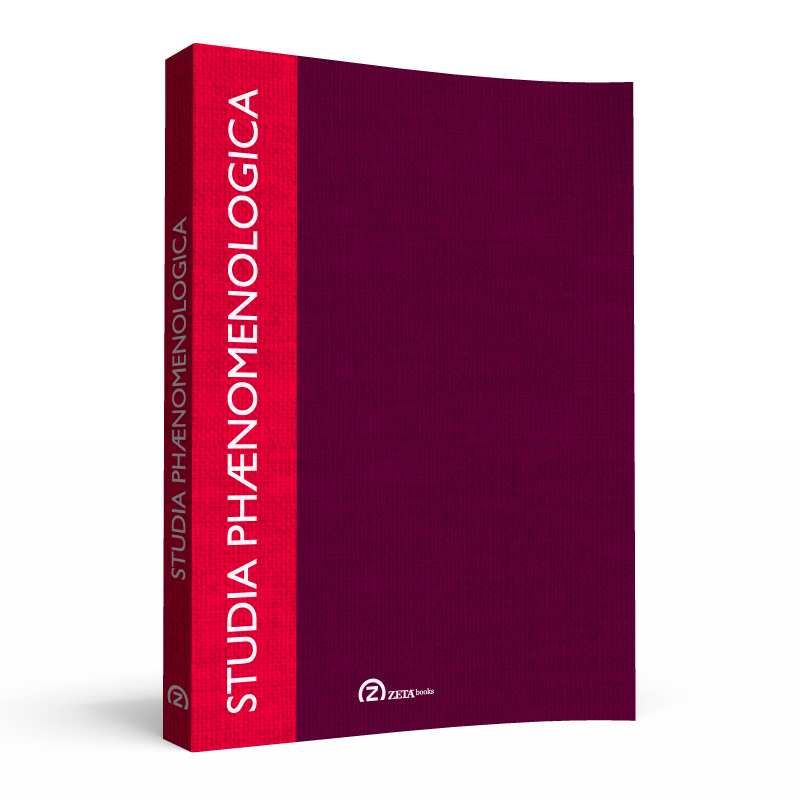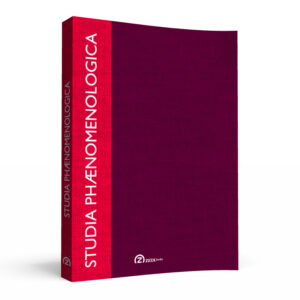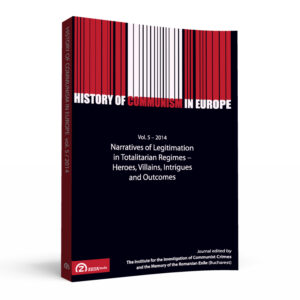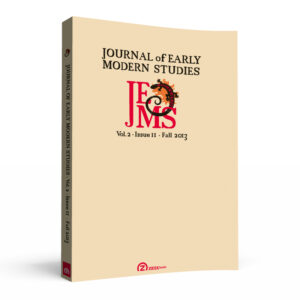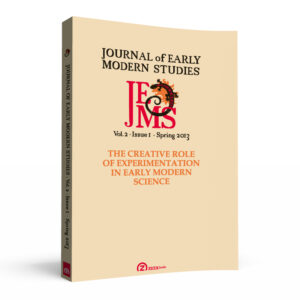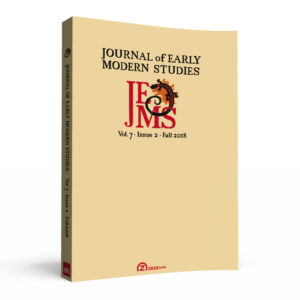A CENTURY WITH LEVINAS: NOTES ON THE MARGINS OF HIS LEGACY
Adina Bozga, Attila Szigeti: A Century With Levinas: Notes on the Margins of His Legacy [OPEN ACCESS]
Yasuhiko Murakami: Horizons de l’affectivité: l’hyperbole comme méthode phénoménologique de Lévinas
Abstract: The “phenomenological” method according to Emmanuel Lévinas consists of two steps: first, reducing the said (le dit) to the saying (le dire); and second, “hyperbole” in his own words. Reducing the said to the saying, in itself, means in this context of the methodology a method to escape from ontology and cognitive philosophy, and to discover the dimension of inter-human facticity. In the second step of “hyperbole”, Lévinas outlines the horizon of this inter-human facticity as that of affectivity. In this horizon (of ethics), the self is defined as phenomena containing the affectivity related to the two extreme situations: personal (physical and mental) suffering and that of the other. Ultimately, the death of the other person and a person’s own possible death limit the internal structure of this horizon.
Matthieu Dubost: Emmanuel Lévinas et la méthode de l’altérité: De la phénoménologie à la vigilance éthique
Abstract: Lévinas never clarified his method himself. This article is an attempt to account for such an omission and also for the non-classical notion of method as it was constructed. By observing the originality of the means by which this philosophy operates, we come to understand that phenomenology is a necessary beginning to perceive the essential ambiguity of phenomenon and the “trace” of alterity. But since this can only be an indicative process, Lévinas must find alternative means of justification, as new forms of reduction. This contingency implies a notion of truth as testimony. The last stage in the method of alterity consists of an “ethical vigilance” in order to distinguish what in Same is Other.
László Tengelyi: Einzigkeit ohne Identität bei Levinas
Abstract: Selfhood, personal identity and singularity are philosophical concepts which undergo a profound change in Levinas, who is led by three main propositions to transform them. The first of these propositions could hardly be simpler: I am myself and no other. The second proposition is more surprising, but it can lay just as well a claim to self-evidence: I remain myself without becoming another even if I do not remain the same as I were. Finally, the third proposition is not only baffling, but almost scandalous: The fact that I am myself and no other cannot be deduced from my identity with myself; it is rather the outcome of my relationshipwith the Other or, more precisely a consequence of what is described by Levinas as my substitution for the Other. These three propositions are inquired into and commented upon in the paper. It is shown, thereby, how a singularity without identity is conceived of by Levinas.
Attila Szigeti: L’autre temps: Lévinas et la phénoménologie husserlienne du temps
Abstract: This paper attempts to show that the diachronic temporality introduced in the second major work of Levinas is profoundly influenced by the genetic dimension of the Husserlian account of time. It is argued that the different phenomena of this genetic-diachronic temporality, like the past which was never present, the originary retention, and the unpredictable present, are sustaining not just the central idea of Otherwise than being, that of an originary ethical subject, but alsothe description of the relation with the other, and the phenomenology of language present in this work.
Fabio Ciaramelli: L’après coup du désir
Abstract: In his first reading of Husserlian phenomenology, Levinas offered a very interesting criticism of the very notion of intuition, understood as an impossible pretension to grasp in its supposed immediacy the self-giving of the Origin. In his mature work, the role of the Husserlian intuition is played by desire: but the latter is conceived in its strong irreducibility to nostalgia. Human desire is always desire of the same for the other. This paper tries to understand the delayed temporalityof desire as rooted in the radical past of separation.
Richard A. Cohen: Some Notes on the Title of Levinas’s Totality and Infinity and its First Sentence
Abstract: Alternative oppositions to “infinity” and “totality” are suggested, examined and shown to be inadequate by comparison to the sense of the opposition contained in title Totality and Infinity chosen by Levinas. Special attention is given to this opposition and the priority given to ethics in relation Kant’s distinction between understanding and reason and the priority given by Kant to ethics. The book’s title is further illuminated by means of its first sentence, and the first sentence is illuminated by means of the book’s title. Special attention is given to explicating the nature and significance of the hitherto unnoticed “informal” fallacy contained in the first sentence.
Yves Mayzaud: Langage et Langue chez Husserl et Lévinas
Abstract: In this contribution the author tries to show the relation between Lévinas and Husserl regarding the question of language and tongue. He begins by explaining what is the conception of language in the Logical Investigations and of tongue in Ideas II. The former allows Husserl to develop a univocal language, whereas the second reinscribes the tongue in the body with his intersubjective dimension. Husserl will have an influence on Lévinas, but the latter will reject his conception of language, for being too formal, and hold Husserl’s concept of the tongue to be a presupposition. Thus, the tongue becomes the way the alterity of the other expresses itself, the way a meaning appears independently from the subject.
Branko Klun: Die Störung der Metaphysik: Levinas gegen Heidegger
Abstract: Although Levinas’ “il y a” does not directly correspond to Heidegger’s conception of being, his criticism of Heidegger’s temporal ontology is nevertheless justified. With the reduction of every meaning (and being) to its temporal constitution, Heidegger excludes any possibility of transcendence beyond time. The problem of overcoming the radical finitude and historicity of meaning, which is ethically motivated, brings Levinas to the age-old question of metaphysics. However, taking Heidegger’s thought seriously, Levinas is forced to look for an entirely new understanding of the metaphysical quest.
Guillaume Fagniez: En découvrant l’existence avec Emmanuel Lévinas
Abstract: This text offers an analysis of the first French reaction to the thought of Heidegger as undertaken by Lévinas. It also seeks to highlight the roots of the uneasy dialogue that Lévinas had with a work which he considered to be at one and the same time “imprescriptible” and answerable for its ambiguities. Indeed, a reading of Lévinas’ pre-war texts demonstrates how his initial interpretation of the core concepts of Sein und Zeit, stretched to the limits by ambiguities, led him to deny the question of being any access to a genuine transcendence: contrary to its explicit treatment by Heidegger. Being itself, understood in the first instance by Lévinas as “determinism of being”, demands the movement of “escape” and the assumption of a truly ethical position, the latter in the early stages of his work remaining almost entirely implicit.
Alain Beaulieu: La dette calculée de Derrida envers Lévinas
Abstract: Derrida’s intellectual itinerary shows a progressive reconciliation with Lévinas’ ethical thinking. “Violence and Metaphysics”, one of Derrida’s earlier essays, was highly critical of Lévinas’ “phallotheology”, whereas his later works were more receptive to the Levinasian analysis on hospitality, “cities of refuge” (villes-refuges) and justice. This essay will discuss the mutual terminological exchanges between Derrida and Lévinas as well as some divergences between the two thinkersregarding the deconstruction project. Finally, we will see how Derrida distinguishes himself from Lévinas’ ethics by bringing an end to the search for the conditions of possibility of experience in favour of a more radical experience of the impossible and the inconditional.
John Drabinski: The Enigma of the Cartesian Infinite
Abstract: In Levinas’ hands, the problematic of transcendence challenges phenomenological description by positing, as primary, that which is outside intentionality. How, then, to think about this transcendence outside intentionality? This essay explores the possibilities of a description of transcendence through Levinas’ and Marion’s readings of the Cartesian idea of the Infinite. What emerges from these readings of Descartes’ idea of the Infinite is a sense of indication that is fundamentally elliptical, pointing beyond what it can render to presence, but pointing nonetheless. Thinking through this problem of elliptical indication, I argue, is central to generating a phenomenological account of transcendence.
Drew Dalton: The Pains of Contraction: Understanding Creation in Levinas through Schelling
Abstract: There is an apparent contradiction within Levinas’ work: on the one hand, Levinas upholds an account of existence that seemingly requires a creation narrative, while maintaining, on the other hand, that an account of the ethical import of that existence needs no recourse to the divine. This seeming contradiction results from a fundamental misunderstanding concerning Levinas’ account of creation and its logical consequences concerning the divine. This paper aims to clarify this misunderstanding by exploring the similarities between and influence of F. W. J. Schelling’s work on Levinas’ thereby providing a more complete picture of both author’s respective accounts of genesis and the existence of God.
Georg W. Bertram: Die Idee der Philosophie von Emmanuel Lévinas
Abstract: This paper aims to offer a new and alternative perspective on the basic idea of Levinas’s philosophy. My claim is that the latter can be more appropriately understood not as a contribution to a new way of thinking about ethics or the realm of the ethical as such, but rather toward the theory of normativity. The goal of Levinas’s reflections on alterity is to exhibit the normativity that is in play in all modes of understanding. Levinas tries to understand how intentional beings are normatively bound by one another. This paper tries to give answers to the questions of (1) why Levinas addresses questions of alterity, (2) what is distinctive about these questions according to his way of thinking, and (3) why one should consider Levinas’ thought from the perspective of the articulation of a theory of normativity.
François-David Sebbah: Levinas: Father/Son/Mother/Daughter
Abstract: The aim of this article is to give an account of the Levinasian description of the Father/Son relation and to evaluate its philosophical implications, in particular in the domain of phenomenology. It will also consider the Levinasian description of the feminine, which is often problematical on account of its machismo. It is argued that these two questions, apparently quite unrelated, are in fact closely linked: they both derive from a common aporia situated at the heart of the decisive phenomenological description of the trial of otherness.
Colin Davis: Levinas and the Phenomenology of Reading
Abstract: Although Levinas showed relatively little interest in secular literature, and indeed he was sometimes distinctly hostile towards it, some of his essays sketch a phenomenological account of the reading experience which is applicable to non-sacred texts. This article compares Levinas’s phenomenology of reading to that of Wolfgang Iser, and argues that it may be susceptible to some of the same criticisms. It then examines Levinas’s 1947 essay “L’Autre dans Proust” in the light of Proust’s Un amour de Swann, suggesting that Levinas’s reading is blind to aspects of Proust’s writing which contradict his ethics. This finally raises questions about the viability of a genuinely enlightening, ethical encounter between reader and text, or between self and other.
Nader El-Bizri: Uneasy Interrogations Following Levinas
Abstract: This paper consists of critical interrogations and speculative reflections on the ethical bearings of Emmanuel Levinas’ resourceful and intricate views on death, otherness, and time, while illustrating the nature of the philosophical challenges confronting the interpreters of his prolific writings, and investigating their intellectual, moral and political prolongations. This line of inquiry probes the multiple aspects of ethical responsibility that are entailed by the “face-to-face” relation with the other, and their potential theoretical extensions in meditations on the notion of “visage”, particularly in the context of concrete practices and everyday demands. Moreover, this study offers selective analytic parallels with Martin Heidegger’s thoughts on mortality, along with associated pointers by Jean-Paul Sartre, in view of further elucidating the ethical implications of Levinas’ thinking, and exploring their tacit entanglements with politics.
TRANSLATING HEIDEGGER REVISITED
George Kovacs: Heidegger’s Contributions to Philosophy and the Failure of “A Grassroots Archival Perspective”
Abstract: This study responds to Theodore Kisiel’s “review and overview” of Contributions, the English translation of Heidegger’s Beiträge, included in his essay published in Studia Phænomenologica, vol. 5 (2005), 277-285. This study shows the uniqueness and the significance of Beiträge, as well as the nature of the venture to render it into English (I); it explores the language and way of thinking, the be-ing-historical, enowning perspective, endemic to Heidegger’s second main work, and identifies the “ideal” and the difficulties of its translation as a hermeneutic labor, as well as the inadequacy of “an archival perspective” for guiding the translation and the grasping of his text (II). Based on these insights, this study, then, leads to a critical assessment of Theodore Kisiel’s hyperbolic, acerbic, despairing reactions to Contributions as a work of translation, thus exhibiting the collapse of his gratuitous assertions and assumptions under their own weight, as well as the failure of his “archival” approach to the translation (and ultimately to the assessment of Heidegger’s thinking) (III); it concludes with showing the nature and the disclosive power of Contributions, as well as its significance for the future of Heidegger studies (IV).
Parvis Emad: Translating Beiträge zur Philosophie as an Hermeneutic Responsibility
Abstract: Based on the distinction between the intra- and interlingual translation, this paper identifies the keywords of Beiträge as the result of Heidegger’s intralingual translation. With his intralingual translation of words such as Ereignis and Ab-grund, Heidegger gives these words entirely new meanings. On this basis, the paper criticizes the existing renditions of the keywords of Beiträge. This criticism is based on the insight that an absolute transfer of the keywords into English is unobtainable. To meet the hermeneutic responsibility of translating Beiträge, we must obtain an approximate translation. The paper concludes by addressing the question whether an approximate translation of the keywords of Beiträge can be faithful to the original German.
VARIA
Rolf Kühn: Die Zeitkritik bei Michel Henry und ihre Konsequenzen für das Verständnis von Welt und Christentum
Abstract: According to Henry, in Husserl’s analysis of time the retentional intentionality of the “now” implies that you cannot have the sensation of its pure reality. This inner-phenomenological criticism can be generally transferred to the relationship between time and life, since temporality, as the most inner structure of the world of becoming-outsideitself, does not allow any affective self-appearance of life. Finally, this aspect has critical consequences for the existential structure of care, which must be suspended as “transcendental illusion” of the ego, in order to do justice to the immediacy of an immemorial birth in life.
David Grandy: Merleau-Ponty’s Visual Space and the Law of Large Numbers
Abstract: Maurice Merleau-Ponty argued that the seeing of things together (focal figure and background objects) accounted for the sense that things possess unseen depth: they are three-dimensional entities, not facades. I compare this idea to the law of large numbers. In both cases, single entities take on substance, depth, or meaning when assimilated into a large body of comparable instances. Thinking along these lines, Erwin Schrödinger proposed that living processes achieve order by virtue of the multiplicity of their constituent parts, any of which, when considered individually, militate against perception and understanding. He further suggested that those parts take their place as things to be perceived even as they constitute our perceiving faculties, and this is why uncertainty occasions their reality. Thus he offers an instance of Merleau-Ponty’s notion of chiasmic intertwining, which allows for world-body interchange or reversibility beyond the reach of unequivocal apprehension.
Caroline Guibet Lafaye: Arts postmodernes, philosophie du langage et phénoménologie
Abstract: The identification of a post-modern art requires the determination of its implicit patterns of signification, as is the case with the modern art’s patterns of signification. In fact, the mere formal and stylistic analyses are not able to distinguish the post-modern art from the modern art. Actually, the specificity of minimalist and post-minimalist sculpture is founded on a phenomenological interpretation of subjective aesthetic experience (the reciprocal glance between who regards and what is regarded) and on a phenomenological interpretation of significance. In other words, this phenomenological interpretation gives a positive content to the concept of post-modern art.
REVIEW ARTICLES
Tinca Prunea-Bretonnet: L’individuation par l’amour: Le phénomène érotique de Jean-Luc Marion
Abstract: This review-article aims to present the inner structure of J.-L. Marion’s book of 2003, Le phénomène érotique. Although closely related to the former development of the phenomenology of donation, his analysis of the concept of love discloses significantly new philosophical elements as it shows the pre-eminence, own rationality and univocity of this concept. My paper basically takes into account the question of the individuation of the other and of the self within the saturated phenomenon of love. I discuss the coherence and conceptual consistency of its “figures” and description. I also try to suggest the possibility to question further in the direction of God as “the third” who grants or attests the individuation of the lovers in a unique common erotic phenomenon. Eventually, I claim that his overwhelming importance might affect the “two-entrance” phenomenon of love and the definition of the lover whose figure he is supposed to assume in his manifestation.
Tracy Colony: Unearthing Heidegger’s Roots: on Charles Bambach’s Heidegger’s Roots
Abstract: Charles Bambach’s recent book Heidegger’s Roots: Nietzsche, National Socialism, and the Greeks traces the themes of rootedness and the earthly in Heidegger’s thought. Focusing on the role of these themes in the major works of the 1930’s, Bambach offers an account of Heidegger’s relation to contemporaneous conservative and National Socialist ideologies. In this review article, I question the fundamental presupposition guiding Bambach’s approach and present specific reservations regarding his use of untranslated material from Heidegger’s Nietzsche lecture courses.
ISSN: 1582-5647
ISBN: 978-973-50-1416-2

